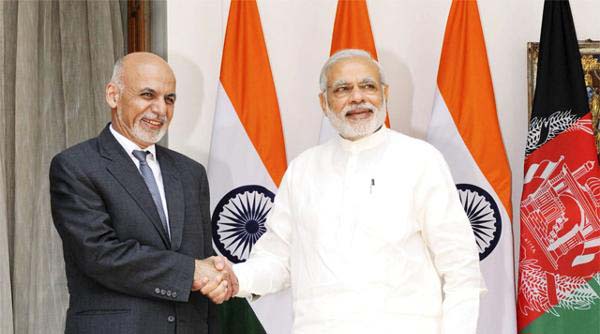During President Ghani’s visit to India, Afghan and Indian leaders agreed to establish a joint Afghan-Indian chamber of commerce to boost trade between the two countries. The day before, Afghan President Ashraf Ghani and Indian Prime Minister Narendra Modi held a joint press conference in New Delhi, expressing their resolve to expand relations between the two countries. During the press conference, Indian Prime Minister assured his country’s support to an Afghan-led peace process that would ensure the Afghan constitution is upheld and Afghanistan’s last fourteen years’ achievements preserved. The two leaders emphasized on mutual interests between Afghanistan and India and the fight against terrorism.
President Ghani’s visit to India is highlighted by his new approach towards Afghanistan’s peace efforts and improving relations with Islamabad aimed at bringing the Taliban leaders to negotiation table. President Ghani’s visit to India is coming at a time when Afghanistan is trying to kick-start the stalled peace negotiations with the Taliban with the help of Pakistan. India has made it clear it is supporting the new Afghan government’s renewed initiative for resuming peace talks with the Taliban. However, India maintains that any peace talks with the Taliban should be Afghan-led and Afghan-owned. Indian reassurance of its support for Afghan-led peace efforts is coming in response to President Ghani’s attempts to convince India over its initiative for resuming the stalled peace talks.
However, the nerve in India was uneasy over the new approach in Kabul and a visible rebalancing of the Afghan government foreign policy towards Pakistan. Since the new National Unity Government came to power in Kabul, Afghanistan has drastically changed its attitudes towards Pakistan. Pakistan is believed to have the ultimate influence over the Afghan Taliban. Since then, the relations between Afghanistan and Pakistan have considerably improved and Afghanistan has secured Islamabad’s backing and cooperation in persuading the Taliban to come to the peace negotiation table.
The new Afghan unity government is trying to convince India for understanding its need for Pakistan’s backing in pursuing peace talks with the Taliban. During his visit to India, the President also referred to this. India has shown in the past that it understands the Kabul’s efforts for improving ties with Pakistan, tacitly endorsing Pakistan’s constructive role in the Afghanistan peace efforts. In response to former President Karzai’s demands for security assistance, Indian officials responded with prudence and caution, and avoided a hasty move that could irritate Pakistan. Seemingly, the long-awaited visit to India has been helpful in ensuring India’s long-term partnership with Afghanistan and its backing for the Afghan-led peace efforts.
During past years, Afghanistan and India developed close relations as two countries held a common ground over fighting terrorism and strengthening regional and international cooperation for backing Afghanistan. Afghanistan sees India as one of the key regional powers that can help Afghanistan’s economic development as well as stabilizing the country. Indian has been one of the major supporters of Afghanistan since the fall of the Taliban regime. With providing over $2 billion in aid to Afghanistan, India has been the fifth major donor country to Afghanistan after the US, UK, Japan and Germany. During past fourteen years, New Delhi has had active presence in Afghanistan’s economic, educational, security and social areas. It has had numerous reconstruction and development projects in Afghanistan’s infrastructure, health, education, security, agriculture, governance sectors.
Afghanistan has always been important for India, and the New Delhi one of the key regional supporters of Afghanistan’s past central governments except the Taliban regime. India sees a strong, independent, stable, prosperous and democratic Afghanistan as being crucial to her security interests and for the overall stability of the region in the evolving geopolitical and geostrategic scenarios. Building up and sustaining the capability of the government of Afghanistan through external assistance to enable it to provide its own security is a major objective for India. For India, Afghanistan is undoubtedly a very important partner in the region to project its power status and to secure its entry into energy rich and untapped markets of central Asia. India has been backing Afghanistan’s reconstruction not only in light of security competition between India and Pakistan but also on Indian pursuit of a desire to show that India has earned the capability to be seen as an extra-regional power moving toward great power status.
In October 2011, Afghanistan and India signed a strategic partnership agreement aimed at securing long-term robust cooperation between Afghanistan and India in many areas. The strategic partnership agreement with India has been aimed at guaranteeing the continuation of the Indian role in reconstruction of Afghanistan and the country’s future commitment at a time when the US and other NATO members are withdrawing from Afghanistan. Despite a visible rebalancing of foreign policy, Afghanistan still sees India, enough strong to play a robust and constructive role in rebuilding the shattered economy of Afghanistan.
Apart from Indian help in Afghanistan’s reconstruction, the government of Afghanistan also views India an important partner for helping securing Afghanistan following complete withdrawal of the US and NATO from the country. Development cooperation along with training, equipping the Afghan security forces by India doesn’t only harm the regional interests of Afghanistan’s neighboring countries but also it can help stabilize the region. Reconstruction and Stabilization of Afghanistan through international aid including India’s assistances pave the way for India to seize economic and trade opportunities in Afghanistan and the central Asian states.
Afghanistan should develop bilateral relations with India in the context of regional cooperation focused on trade and economic relations between India, Pakistan, Afghanistan, China, the Central Asian States as well as Russia and Europe. Afghanistan’s regional approach will serve interests of both India and Pakistan, while the two South Asian countries can engage in constructive cooperation in Afghanistan that would boost their own relations as well. It is never early for Afghanistan to seek a cohesive regional cooperation through expanding relations with the regional countries including India and Pakistan.

